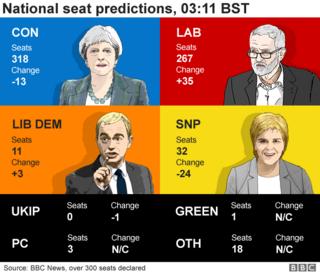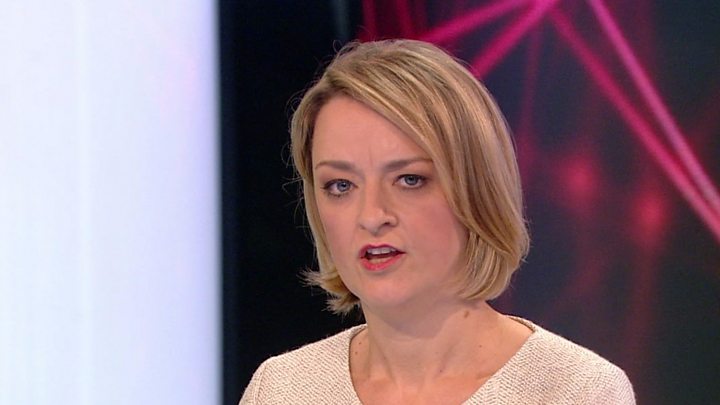UK election 2017: Conservatives 'to fall short of majority' - BBC News
 Image caption The results of the exit poll predict that the Conservative party could suffer a humiliating reduction in seats
Image caption The results of the exit poll predict that the Conservative party could suffer a humiliating reduction in seats The Conservatives are set to be the largest party in the UK parliament, but may not have an overall majority, says the latest BBC forecast.
The survey a swing to the Labour Party in Thursday's general election.
This would be a humiliation for Prime Minister Theresa May, who chose to call the election to try to strengthen her hand in talks with the EU on Brexit.
Labour leader Jeremy Corbyn urged Mrs May to resign, but she signalled that the Tories would seek to stay in power.
"At this time more than anything else, this country needs a period of stability," Mrs May said.
"And if, as the indications have shown and if this is correct that the Conservative Party has won the most seats and probably the most votes, then it will be incumbent on us to ensure we have that period of stability - and that is exactly what we will do."
Mr Corbyn earlier said: "If there is a message from tonight's results, it's this: the prime minister called this election because she wanted a mandate. Well, the mandate she's got is lost Conservative seats, lost votes, lost support and lost confidence."
"I would have thought that's enough to go, and make way for a government that will be truly representative of all of the people of this country," he added.
The pound fell sharply in value after the exit poll was published. It is too early to say whether it is accurate.
Final election results are expected by Friday lunchtime.
The biggest shock of the night so far has been the Liberal Democrat MP Nick Clegg losing his seat to a Labour candidate.
He was deputy prime minister of the UK from 2010 to 2015 in a coalition government with the Conservatives.
Election results: Live updates
A total of 650 Westminster MPs will be elected, with about 45.8 million people entitled to vote. A party needs 326 seats to have an overall majority.
Image copyright EPA Image caption Prime Minister Theresa May's party would be 12 seats short of an overall majority, the exit poll suggestsPrime Minister Theresa May - who had a small majority in the previous parliament - called the snap election to try to improve her negotiation positions on Brexit.
But if the exit poll is borne out by results, analysts say the PM will have made a serious miscalculation.
Image copyright AFP/Getty Images Image caption Jeremy Corbyn's Labour Party will gain 34 seats, according to the exit pollWhat did the exit poll say?
To get an overall majority, one party needs to get 326 seats.
The exit poll, published after polling stations closed at 22:00 BST on Thursday, suggests the Conservatives will win 318 seats, a loss that would leave them eight seats short of an overall majority.
It suggests Labour will gain 35 seats, the Conservatives lose 13 seats, the Lib Dems will gain three and the Scottish National Party (SNP) lose 24 seats.
The Green Party would be unchanged with one seat and Plaid Cymru still have three MPs in Wales, according to the poll.
Northern Ireland has different political parties.

Media playback is unsupported on your device
Media caption BBC's Laura Kuenssberg: Theresa May has played a "high risk" political gameIn total, 30,450 people were interviewed as they exited from 144 polling stations across the UK.
The exit poll is traditionally more reliable than polls conducted throughout the election campaign, as it surveys people who have already voted and asks them what they chose, as opposed to speaking to people who may change their mind or may not actually go to the ballot box.
Image copyright EPA Image caption In Glasgow, SNP leader Nicola Sturgeon voted at a local community hall Image copyright AFP Image caption Lib Dem leader Tim Farron looked cheerful despite the rain after voting in Kendal, CumbriaWhy the election matters - it's all about Brexit
The election will largely determine the UK's negotiation policies in upcoming negotiations with the EU on Brexit.
Theresa May was against Brexit before last year's referendum - but now says there can be no turning back and that "Brexit means Brexit".
The reason the prime minister gave for calling the election was to strengthen her hand during the negotiations.
The Conservatives' priorities were set out in a 12-point plan published in January and the letter formally invoking Brexit in March.
The key elements include:
- No longer being bound by EU law and European Court of Justice rulings
- Quitting the EU single market and seeking a "comprehensive" free trade deal in its place
- Striking trade deals with other countries around the world
The Labour Party campaigned against Brexit in the referendum but now says the result must be honoured, and is aiming for a "close new relationship with the EU" with workers' rights protected.
The party has set out several demands and tests it says Brexit must meet. These include:
- Aiming for "tariff-free access" to the EU single market, while accepting "unchanged access" is impossible
- Leaving the option of the customs union on the table
- Refusing to accept a "no deal" scenario
Where UK's parties stand on Brexit
What is the early reaction from the parties?
Veteran Conservative MP Ken Clarke said he believed his party would have a "small overall majority" when all the votes have been counted.
Shadow foreign secretary Emily Thornberry of Labour said her party "could form the next Government".
"If (Theresa May) wanted to get a mandate out of this election she hasn't got it," she continued.
"She has failed."
Leader of UK Independence Party Paul Nuttall tweeted: "If the exit poll is true then Theresa May has put Brexit in jeopardy. I said at the start this election was wrong. Hubris."
SNP Deputy Leader Stewart Hosie said it would be an "extraordinary thing" for Theresa May "to call this election for narrow party advantage and then, if these numbers are correct, to blow it incredibly".
A Lib Dem source said it was "too early" to comment on the exit poll, but added: "In this election holding our own is a good night."
Green co-leader Caroline Lucas said she could "hardly dare hope" that the exit poll was right, adding: "To be clear, Greens will never support a Tory government."
What about a possible impact on the UK economy?
When the election exit poll was revealed, the pound immediately dropped by 2% as investors took a position that a hung parliament was a possible outcome, writes BBC's Economics Editor Kamal Ahmed.
Image copyright Reuters Image caption The pound fell sharply against the dollar after the exit polls were released.Why would that lead the currency to decline? Because a hung parliament means that the government's direction of travel would be less certain.
Deals would have to be done. And those vital Brexit negotiations could become all the more difficult.
The future of the UK economy could be confused by a fog of political to-ing and fro-ing, our editor says.